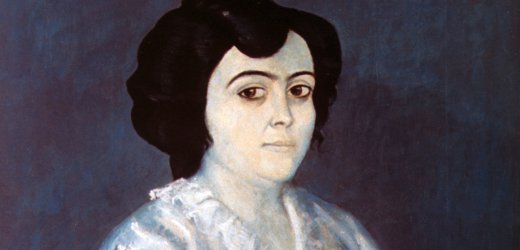News:
One Jewish Family's Battle with a Munich Museum
By Michael Sontheimer

Picasso's "Madame Soler" has become the subject of yet another battle relating to art looted during World War II.
Heirs of the Berlin banker Paul von Mendelssohn-Bartholdy have demanded that a Munich art museum return a Picasso they say was sold during World War II as a result of Nazi persecution. But the museum seems uninterested in pursuing a fair resolution.
When Bernd Neumann, Germany's minister of state for culture, is asked about the Washington Conference Principles, he quickly reverts to the practiced narrative of guilt that German politicians adopt whenever the Holocaust is mentioned.Germany recognizes its "unreserved moral responsibility for the restitution of looted art," Neumann, a member of Chancellor Angela Merkel's conservative Christian Democrats, says in such situations. The Washington principles, signed by 44 countries in 1998, obligates signatories to find a just and fair solution to disputes resulting from artworks looted by the Nazis during and immediately prior to World War II. Germany, Neumann never tires of insisting, is committed to doing its part.
Yet as soon as German museum directors or their legal counsels are faced with the prospect of implementing the Washington principles, things look quite a bit different. Should expensive paintings by well-known artists be involved, museums in Germany tend to delay its return to the proper owners for as long as possible. They play for time and use every conceivable excuse to dally.
That, at least, has been the experience of Berlin-based historian Julius Schoeps, 69, in his dealings with the Munich's Neue Pinakothek museum. Schoeps, a descendant of the philosopher Moses Mendelssohn and the composer Felix Mendelssohn-Bartholdy, has joined 29 other heirs of the Berlin banker Paul von Mendelssohn-Bartholdy in requesting the return of the Picasso painting "Madama Soler" from the Bavarian State Painting Collections.
Uncertain Prospects
This is not the first such legal battle the Mendelssohn heirs have engaged in. In 2008, they demanded the return of "Boy Leading a Horse" from the Museum of Modern Art and "Le Moulin de la Galette" from the Guggenheim Museum, both Picassos. Given the uncertain prospects of winning the legal battle in US courts, they agreed to withdraw their claim in exchange for a $5 million payment.
In a verdict preparatory to the settlement, a judge at the US District Court in New York wrote: "Claimants have adduced competent evidence that Paul never intended to transfer any of his paintings and that he was forced to transfer them only because of threats and economic pressures by the Nazi government."
Even before the Nazis rose to power in Germany in 1933, Paul Mendelssohn-Bartholdy was concerned about what might happen. "The Jews will have problems," he said at the time. During the Nazi Aryanization campaign in 1933, he was ejected from the Central Association of German Banks and Bankers and from the board of the Reich Insurance Office. His assets quickly began to dwindle and, starting in 1934, he began selling pictures from the exquisite collection assembled for him by the art dealer Alfred Flechtheim.
Still, he was able to transport five Picasso paintings to Switzerland where the German-Jewish art trader Justin Thannhauser, based at the time in Basel, undertook the sale of the artwork.
Mendelssohn-Bartholdy died in May 1935. It remains unclear whether Thannhauser ever paid him or his heirs for the five Picassos. It is known, however, that the Bavarian State Painting Collections bought "Madame Soler" from the Thannhauser Gallery in New York in 1964. Today, the painting -- which depicts the wife of a tailor in Barcelona who Picasso supported before he became famous -- is likely worth several million euros.
Burden of Proof
The Mendelssohn-Bartholdy heirs and their Washington-based lawyer argue that Thannhauser was never the legal owner of the paintings. But Andrea Bambi, who researches the provenance of works of art for the Pinakothek in Munich, insists that the sale was legitimate. The art historian also doubts whether Mendelssohn-Bartholdy was faced with serious economic pressure that might have led him to sell the paintings. The bankers fortune, she says, was immense according to his testament opened after his death.
"It is obscene," says Julius Schoeps, "that we descendents of Nazi victims now must prove that our predecessors were really persecuted as Jews."
Schoeps can at least refer to Bernd Neumann, who said: "Doubt must be resolved in favor of the persecuted." And it is just, Neumann said, "that the burden of proof lies with public facilities."
There is a possible way out of the current confrontation. The German government has established a commission to look into contested cases like that of the Mendelssohn-Bartholdy paintings. The commission, led by a former president of the German Constitutional Court, makes recommendations as to what "fair resolutions" might look like.
The lawyer for the Mendelssohn-Bartholdy heirs recommended that the commission be contacted in the case. But the Munich museum has refused. The reason must sound deeply cynical to the ears of the Mendelssohn-Bartholdy descendents. "The commission," said the Pinakothek legal council Robert Kirchmaier, "was founded for ambiguous cases. Not for clear-cut ones such as this."
http://www.spiegel.de/international/zeitgeist/0,1518,792327,00.html

